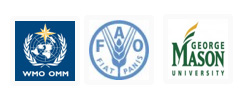Organized by the George Mason University (GMU), the World Meteorological Organization (WMO) and the Food and Agriculture Organization of the UN (FAO), in collaboration with 11 co-sponsors, the International Symposium on Weather and Climate Extremes, Food Security and Biodiversity has produced a final declaration, including a list of “salient recommendations” on the issues.
 24 October 2014: Organized by the George Mason University (GMU), the World Meteorological Organization (WMO) and the Food and Agriculture Organization of the UN (FAO), in collaboration with 11 co-sponsors, the International Symposium on Weather and Climate Extremes, Food Security and Biodiversity has produced a final declaration, including a list of “salient recommendations” on the issues.
24 October 2014: Organized by the George Mason University (GMU), the World Meteorological Organization (WMO) and the Food and Agriculture Organization of the UN (FAO), in collaboration with 11 co-sponsors, the International Symposium on Weather and Climate Extremes, Food Security and Biodiversity has produced a final declaration, including a list of “salient recommendations” on the issues.
The Symposium was held at the George Mason University, Virginia, US, from 20-24 October 2014. It brought together experts from UN agencies, governments, universities, research organizations and the private sector to discuss weather and climate extremes, food security and biodiversity, as well as impacts in different regions around the world.
The Symposium has produced 22 recommendations, which stress, inter alia, the need to: carry out predictability and prediction studies of extreme weather events; improve data from better observation networks to meet developing countries’ needs; have standardized definitions and methodologies of estimating weather and climate extremes; and prioritize systematic monitoring of the impacts of weather and climate extremes. The Symposium has further recommended that ocean and satellite data of consistent quality be operationalized and maintained; capacity in using various types of data, including those from model simulations, projections and predictions, be enhanced; priority be given to building pro-active risk management strategies; and that improved and sustained funding resources for the generation of seasonal climate forecasts and early warning systems be ensured.
The Symposium’s other recommendations include: implementing efficient risk transfer mechanisms to assist farming communities; promoting comprehensive climate adaptation research efforts to improve food security and conserve biodiversity; and establishing appropriate mechanisms to promote interactions between the academic community, decision makers and user communities. [WMO Press Release] [Symposium Declaration][Event website]